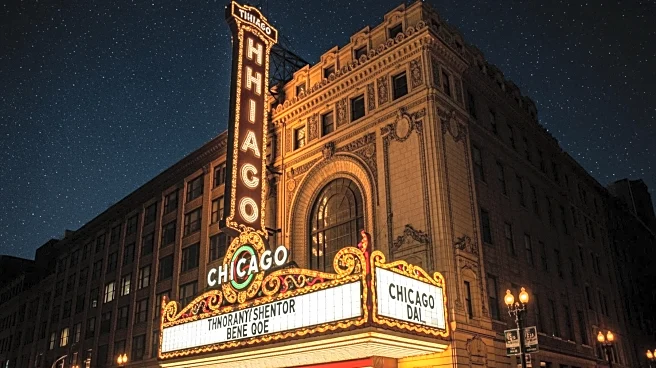What's Happening?
The Goodman Theatre, a cornerstone of Chicago's cultural scene, is celebrating its 100th anniversary. Founded in 1925 by the Goodman family in memory of Kenneth Sawyer Goodman, the theater has evolved from a drama school to a leading professional theater.
Over the decades, it has been instrumental in shaping Chicago's theatrical identity, hosting groundbreaking productions and nurturing local talent. The theater's history is marked by significant milestones, including the premiere of David Mamet's 'American Buffalo' and collaborations with renowned artists like Robert Falls and Brian Dennehy. The Goodman Theatre has consistently pushed artistic boundaries, contributing to Chicago's reputation as a major theatrical hub.
Why It's Important?
The Goodman Theatre's centennial is a testament to its enduring influence on American theater. As a pioneer in regional theater, it has played a crucial role in decentralizing the arts from Broadway, fostering local talent, and bringing diverse narratives to the stage. Its commitment to artistic excellence and innovation has not only enriched Chicago's cultural landscape but also set a standard for theaters nationwide. The Goodman Theatre's legacy highlights the importance of regional theaters in promoting cultural diversity and accessibility, making high-quality performances available beyond traditional centers like New York City.
What's Next?
Looking ahead, the Goodman Theatre plans to continue its tradition of artistic innovation and community engagement. Under the leadership of Susan Booth, the theater aims to explore new narratives and expand its reach through ambitious productions. Upcoming projects include an off-site interactive experience inspired by neuroscience, showcasing the theater's commitment to pushing creative boundaries. As it enters its second century, the Goodman Theatre is poised to further solidify its role as a leader in American theater, fostering new talent and engaging audiences with compelling stories.
Beyond the Headlines
The Goodman Theatre's journey reflects broader trends in the arts, such as the shift towards regional theater and the growing importance of cultural institutions in urban development. Its success underscores the value of investing in the arts as a means of community building and economic growth. The theater's ability to adapt to changing cultural and economic landscapes serves as a model for other institutions facing similar challenges. As the Goodman Theatre continues to evolve, it remains a vital part of Chicago's identity, embodying the city's spirit of innovation and resilience.

















